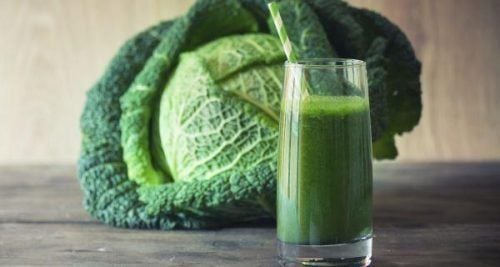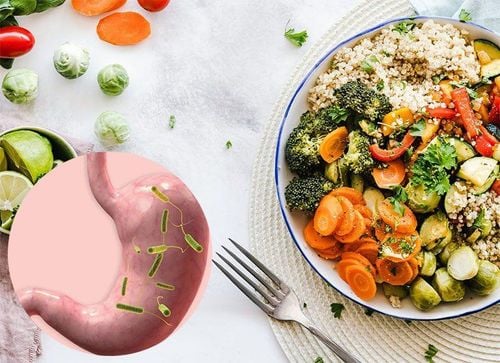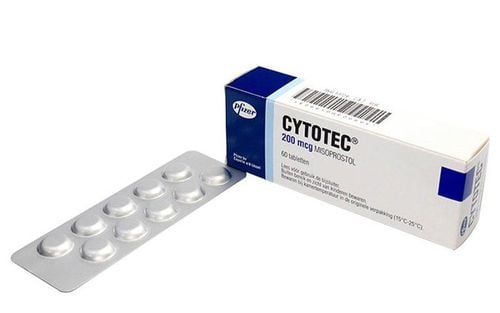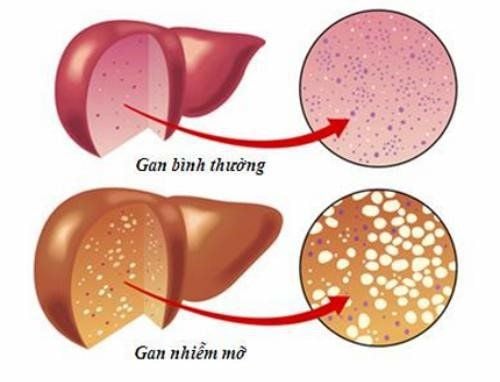By Mai Vien Phuong, MD - Department of Outpatient & Internal Medicine - Vinmec Central Park International General Hospital
Conventional treatment of stomach ulcers often relies on medications that can cause negative side effects such as headaches and diarrhea. For this reason, interest in alternative remedies has steadily increased and is being promoted by both medical professionals and individuals with ulcers alike.
This article lists 9 science-backed natural ulcer remedies.
1. Cabbage Juice
Cabbage is a popular natural ulcer remedy. Doctors have been using cabbage for decades before antibiotics to help heal stomach ulcers. It is rich in vitamin C, an antioxidant that helps prevent and treat H. pylori infections. H. pylori infection is the most common cause of stomach ulcers.
Some animal studies have shown that cabbage juice is effective in treating and preventing a variety of digestive ulcers, including those that affect the stomach.
In humans, early studies observed that drinking fresh cabbage juice daily may help heal stomach ulcers more effectively than the conventional treatment used at the time.
In one study, 13 participants suffering from stomach and upper digestive tract ulcers were given around one quart (946 ml) of fresh cabbage juice throughout the day. On average, these participants’ ulcers healed after 7–10 days of treatment. This is 3.5 to 6 times faster than the average healing time reported in previous studies in those who followed a conventional treatment.
In another study, the same amount of fresh cabbage juice was given to 100 participants with stomach ulcers, most of whom had previously received conventional treatment without success. 81% were symptom-free within a week. However, researchers have yet to identify the exact compounds that promote healing, and no recent studies could be identified.
Furthermore, neither of these early studies had a proper placebo, which makes it difficult to know for sure that the cabbage juice is what is causing the effects.

2. Licorice
Licorice is a spice native to Asia and the Mediterranean region. It comes from the dried root of the Glycyrrhiza glabra plant and is a popular traditional herb used to treat a variety of ailments.
Some studies report that licorice root may have ulcer-preventing and anti-ulcer properties. For example, licorice may stimulate the stomach and intestines to produce more mucus, which helps protect the stomach lining. Extra mucus may also help speed up the healing process and help reduce pain from ulcers.
Researchers further report that certain compounds found in licorice may prevent the growth of H. pylori. However, studies are generally based on the use of these compounds in supplement form.
Therefore, it’s unclear how much dried licorice root someone would need to consume to experience the same beneficial effects. Dried licorice root should not be confused with licorice-flavored candy or candies. Licorice candy is unlikely to produce the same effects and is often very high in sugar.
Additionally, some studies have reported no effect, so using licorice as an ulcer treatment may not be effective in all cases. Licorice may also interfere with certain medications and cause side effects, such as muscle pain or numbness in the extremities. Consider talking to your doctor before increasing the amount of licorice in your diet.
3. Honey
Honey is an antioxidant-rich food that has been linked to several health benefits. These include improved eye health and a reduced risk of heart disease, stroke, and even some cancers. Honey has also been shown to prevent the formation and promote the healing of many wounds, including ulcers.
What’s more, scientists believe that honey’s antibacterial properties may help fight the bacteria H. pylori, one of the most common causes of stomach ulcers.
Some animal studies provide support for honey’s ability to reduce the risk of developing ulcers, as well as the time it takes for wounds to heal. However, human studies are needed.
4. Garlic
Garlic is another food that has antibacterial and antimicrobial properties.
Animal studies have found that garlic extract can speed up the healing of ulcers and even reduce the likelihood of them developing in the first place. Furthermore, laboratory, animal, and human studies have reported that garlic extract can help prevent the growth of H. pylori bacteria, one of the most common causes of ulcers.
In a recent study, eating two cloves of raw garlic every day for three days significantly reduced bacterial activity in the stomach lining of patients infected with H. Pylori.
However, not all studies were able to reproduce these results and more are needed before strong conclusions can be made.

5. Turmeric
Turmeric is a South Asian spice used in many Indian dishes. It is easily recognizable by its rich yellow color. Curcumin, the active ingredient in turmeric, is believed to have medicinal properties.
These range from improving blood vessel function to reducing inflammation and the risk of heart disease. Furthermore, curcumin’s anti-ulcer potential has recently been studied in animals. It appears to have the potential to prevent damage caused by H. pylori infection. It may also help increase mucus production, effectively protecting the stomach lining against irritants.
One study gave 25 participants 600 mg of turmeric five times a day. Four weeks later, ulcers had healed in 48% of the participants. After twelve weeks, 76% of the participants were ulcer-free.
In another, people who tested positive for H. pylori were given 500 mg of turmeric four times a day. After four weeks of treatment, 63% of the participants were ulcer-free. After eight weeks, this increased to 87%.
That said, neither of these studies used a placebo treatment, making it difficult to know whether turmeric was the reason participants’ ulcers healed. Therefore, further research is needed.
6. Mastic
Mastic is a resin obtained from the Pistacia lentiscus tree, commonly known as the mastic tree. Other common names include Arabic gum, Yemen gum, and tears of Chios.
The mastic tree typically grows in the Mediterranean region, and its resin can be dried into brittle, translucent resin flakes. When chewed, the resin softens into a white, opaque gum with a pine-like flavor. Mastic has long been used in ancient medicine to treat various intestinal disorders, including stomach ulcers and Crohn’s disease.
More recently, animal studies have reported that it may act as a powerful natural ulcer remedy.
Additionally, a study of 38 participants with ulcers reported that consuming 1 gram of mastic gum daily reduced ulcer-related symptoms by 30% compared to a placebo. By the end of the two-week study, ulcers had healed in 70% of participants in the mastic group compared to just 22% of those in the placebo group. Mastic also appears to have antibacterial activity against H. pylori.
In a recent study, taking 350 mg of mastic gum three times a day for 14 days eliminated H. pylori infections 7–15% more effectively than standard treatment. While this finding was not observed across all studies, long-term use of mastic gum is generally considered safe. So it may be worth trying it for yourself.
Mastic can be found in most health food stores as a chewing gum or a powdered supplement.
7. Chili Peppers
It is a common belief among people with ulcers that eating chilies too often or in large quantities can cause stomach ulcers. People with ulcers are often advised to limit their intake of chilies or avoid them altogether. However, recent research suggests that these chilies are unlikely to cause ulcers and may help get rid of them. This is because chilies contain capsaicin, an active ingredient that reduces stomach acid production and increases blood flow to the stomach lining. Both of these factors are thought to help prevent or heal ulcers. The capsaicin found in chilies may also help increase mucus production, which can coat the stomach lining and protect it from injury.
Most, though not all, animal studies show beneficial effects. However, very few human studies can be found.
Besides, note that the animal studies above used capsaicin supplements instead of whole chili peppers. In at least one study, such supplements led to more severe stomach pain in some individuals.
Therefore, it is best to eat whole food and adjust your intake based on your tolerance.
8. Aloe Vera
Aloe Vera is a plant widely used in the cosmetic, pharmaceutical, and food industries. It is widely known for its antibacterial and skin-healing properties. Interestingly, aloe vera may also be an effective remedy for stomach ulcers.
In one study, consuming aloe vera significantly reduced the amount of stomach acid produced in rats with ulcers. In another study in rats, aloe vera was as effective at healing ulcers as omeprazole, a common anti-ulcer drug. However, few studies have been conducted in humans. In one, a concentrated aloe vera juice was used to successfully treat 12 patients with stomach ulcers.
In another study, taking antibiotics with 1.4 mg/pound (3 mg/kg) of aloe vera daily for six weeks was as effective as conventional treatment in healing ulcers and reducing H. pylori levels.
Aloe vera intake is generally considered safe, and the studies above have shown some promising results. However, more research is needed in humans.

9. Probiotics
Probiotics are live microorganisms that provide a wide range of health benefits. Their benefits range from improving your mental health to improving your gut health, including the ability to prevent and fight ulcers.
Although how they work is still being studied, probiotics appear to stimulate mucus production, which protects the stomach lining by coating it. They may also promote the formation of new blood vessels, which can help ease the delivery of healing compounds to the ulcer site and speed up the healing process.
Interestingly, probiotics may play a direct role in preventing H. pylori infections. What’s more, these beneficial bacteria appear to enhance the effectiveness of conventional treatments by about 150%, while reducing diarrhea and other antibiotic-related side effects by up to 47%.
The dose needed to achieve maximum benefit is still being studied. That said, most of the studies above report benefits after taking 200 million to 2 billion colony-forming units (CFU) for 2–16 weeks.
Probiotic-rich foods tend to provide fewer CFU per serving than supplements, but they’re still worth adding to your diet.
Good sources include pickled vegetables, tempeh, miso, kefir, kimchi, sauerkraut, and kombucha.
10. Foods to Avoid
Just as some foods can help prevent ulcers from forming or help them heal faster, others have the exact opposite effect.
People who are trying to heal their stomach ulcers or avoid developing them should consider minimizing their intake of the following foods:
- Milk: Although once recommended to help reduce stomach acid and relieve pain, new research shows that milk increases stomach acid production and people with ulcers should avoid it.
- Alcohol: Drinking alcohol can damage the stomach and digestive tract, increasing the likelihood of ulcers.
- Coffee and soft drinks: Coffee and soft drinks, even decaf, can increase the production of stomach acid, which can irritate the stomach lining.
- Spicy and fatty foods: Foods that are too spicy or fatty can cause discomfort in some people. Chili peppers are an exception, based on individual tolerance.
In addition to avoiding the above foods, consuming small meals at regular times, snacking throughout the day, eating slowly and chewing thoroughly can help reduce pain and promote healing.
In addition, avoiding smoking and reducing stress are two additional helpful ulcer prevention strategies.
Conclusion
Stomach ulcers are a relatively common and uncomfortable medical condition. The natural remedies listed above may help prevent the development of stomach ulcers and facilitate their healing. In some cases, they may even improve the effectiveness of conventional treatments and reduce the severity of side effects.
It is important to note that in most cases, it is unclear whether these natural remedies are as effective as conventional treatments. Therefore, people with ulcers should seek advice from their healthcare professional before self-medicating.
To arrange an appointment, please call HOTLINE or make your reservation directly HERE. You may also download the MyVinmec app to schedule appointments faster and manage your reservations more conveniently.














